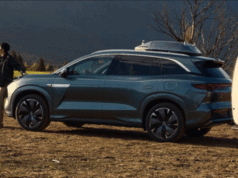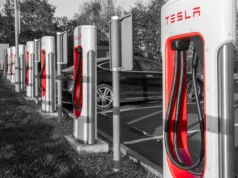Chinese EV maker BYD has denied claims it is stockpiling vehicles to take advantage of a loophole in the federal government’s new emissions regulation. The company has raised eyebrows after images recently emerged of thousands of its cars being stored at a popular Aussie theme park.
The government’s New Vehicle Efficiency Standard (NVES) began this year to encourage more fuel-efficient vehicles onto the roads. It awards car makers with credits based on how many vehicles they import, rather than sales volume. The credits can also be sold to other automakers.
BYD imported 50,918 cars in the year to September, according to data from the Federal Chamber of Automotive Industries (FCAI), but sold just 37,923 cars in that period. In comparison, rivals like Tesla imported 22,355 cars and sold 22,653, while GWM imported 41,315 cars and sold 34,733, keeping tighter inventories.
RELATED
BYD Australia chief operating officer Stephen Collins denied the EV giant was stockpiling government credits and said the imports were simply to satisfy the rising demand for its cars.
“There’s no other reason why we hold stock,” he told The Australian Financial Review, saying BYD wouldn’t “shy away” from the high levels of stock it needed to meet growth ambitions.
“By the end of next year, if we weren’t somewhere close to the top three, I think I would be a bit disappointed.”
Do you have a story to share? Contact tamika.seeto@yahooinc.com
Collins said rivals like MG had tighter import-to-sales ratios because they were not on a similar trajectory to BYD.
“I’d be guessing they’re not growing at 150 per cent with a plan to grow even further into next year,” he said.
“Nor are they launching four new models all at the same time, nor are they putting on 30 per cent more dealers. So it’s this extraordinary growth.”
BYD could earn $7,050 in credits on each Sealion 7 it imports, the AFR calculated, with the Chinese car giant importing 15,649 units of the SUV and selling 8,484 over the same period.
The Australian Automotive Dealer Association has called for carbon credits to be applied at the point of sale or registration to minimise the risk of dealers sitting with excess stock.
Images of thousands of BYD cars being stockpiled in NSW and Victoria recently emerged, including at the Jamberoo Action Park south of Sydney.
Complaints from residents over the “car graveyard” led to the Kiama Council intervening and declaring the vehicles were stored without approval.
The theme park has lodged a development action, but until that is approved, the site can’t operate as a logistics or storage centre.
Collins said he had no regrets over storing cars at the Jamberoo theme park, with the move done by a third-party storage provider. BYD has now taken over full control of its car storage.
BYD is now the world’s biggest manufacturer of electric cars.
In Australia, BYD sales are up nearly 150 per cent year to date, which has been fueled by the Shark 6 ute, the Sealion 7 electric SUV and the Shark 6 plug-in hybrid ute.
BYD is currently in eighth place for sales in Australia, which means it will need to surpass GWM, Mitsubishi, Hyundai, Kia, Mazda and Ford to get into the top three.
EV sales accounted for more than 12 per cent of new cars in the first half of 2025, with the national EV fleet growing to more than 410,000 vehicles.
About 77 per cent of all EVs purchased this year were made in China.
Get the latest Yahoo Finance news – follow us on Facebook, LinkedIn and Instagram.






